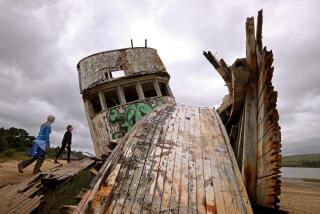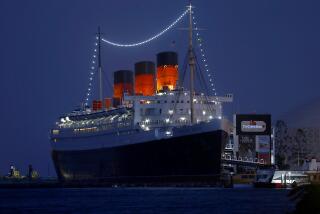Boating firm is battening down the hatches
- Share via
For the Camello family of San Pedro, the repossessed 40-foot sailboat with its mahogany decks and twin carbon fiber masts has come to symbolize all that has gone wrong with their business and the pleasure-craft industry.
The sailboat sits quietly at the family business, Colonial Yacht Anchorage in Wilmington.
Until the recession hit, the company focused on managing its own vessel repair business and 120-slip marina. Now it’s selling repossessed vessels such as this schooner.
“This boat should be out for a cruise off Cabo San Lucas. If the economy was great, she’d fetch at least $40,000. We’ll be lucky to get $15,000 for her,” said Carlo Camello, youngest of the three sons and one daughter who help matriarch Rafaeli Camello run the 60-year-old family business. “No one has the money for toys anymore.”
At the Camellos’ asking price of $19,900, the boat would be valued about the same as the Blue Book value of a 2006 Ford F-150 pickup truck.
The Camellos are feeling a collective pain. Boat sales are down sharply. Builders and dealers fear they may face bankruptcy. Marinas have empty boat slips and abandoned vessels. Repair yards are idled. To keep going, the Camellos have lowered their prices for repairs and slip rentals. And over the last year they’ve built up a new business: repossessing the yachts of those who can no longer pay their bills.
Now, abandoned and repossessed boats bob alongside the vessels of longtime rental customers at the family marina. And it’s still hard to make ends meet.
“It’s terrible. It’s the worst we’ve ever seen,” said Joe Camello, 53. “People have other priorities, like their house and their car. Boats are a luxury, and they are always the first thing to go when people are cutting back.”
From a former complement of 22 employees, Joe said that the company was down to 14 workers. The boatyard staff, which once numbered 18, is down to seven employees, Joe said.
“We’re a year behind on debts, borrowing more money,” Joe said. “We are running very lean. I’m afraid to think about it. We’re just trying to keep our doors open.”
According to Spader Business Management Inc., which tracks boat dealer performance, new boat sales were down by 34.2% nationwide through Sept. 30, compared with the same nine-month period in 2008.
Perhaps even more alarming is the pace of boat repossessions, which are continuing to rise, according to the companies that receive the seizure orders from banks and other lending institutions. Fort Lauderdale, Fla.-based National Liquidators, a division of G. Robert Toney & Associates Inc., is widely known in the boating industry as the nation’s largest vessel repossession business, seizing small boats, oceangoing freighters and other large commercial vessels.
National Liquidators runs three offices, in Florida, California and Ohio. In 2007, National Liquidators was asked to seize 2,136 watercraft, President Bob Toney said. By 2008, the number had soared to 3,372 orders, about 281 a month, the most ever in its 21 years of operation. In 2009, the pace has ranged from 380 to 400 orders a month and shows no sign of slowing down, Toney said.
Toney says the company’s inventory of boats for sale has quadrupled since 2006. His staff of repossession agents has doubled to 85. About 20% of the seizure orders are run out of the California office and involve vessels throughout the Western U.S.
“It’s going to slow down eventually and level off because the banks just aren’t lending,” he said. “We are estimating that it plateaus somewhere between the middle and the end of 2010. The economy improving has not meant a decrease in repossessions.”
Matt Gruhn, associate publisher of Boating Industry, said in a column in the publication’s most recent issue that the business was undergoing a generational shift. Baby boomers are buying fewer boats, but the industry has not yet reached out to younger buyers. The change is happening as potential buyers of all ages have been slammed by the weak economy.
“The economic landscape has changed,” Gruhn said. “Consumer spending will be lower than we have been accustomed to. Our industry’s consumer demographics will transition from the baby boomers to Gen X and Y.”
Few probably have a better sense of all that than the Camellos, whose marina is on the Cerritos Channel near the Commodore Schuyler F. Heim Draw Bridge that links Terminal Island to the mainland. The Camellos would not discuss exact sales figures, but said there were several reasons they were entering the slowest time of the year for business with the smallest cushion ever.
Colonial Yacht Anchorage can work on any kind of sailboat or powerboat up to about 47 feet in length. But this year, to get customers to bring their vessels in for what is normally the bread-and-butter business of cleaning boat bottoms and adding anti-fouling coating, the company advertised that it wouldn’t charge to haul the boats out of the water.
That would save customers as much as $450 on the cost of a repair job, but Joe said the promotion didn’t help much.
Maria Camello, 47, says the company is back to renting boat slips at $8 a foot to hang on to its marina customers.
“It’s like we’re reliving the 1980s,” Maria said.
But the boat abandonments keep piling up, rising from an average of six or seven a year to more than one a month for Colonial Yacht Anchorage in 2008 and 2009. And when a boat is abandoned at a marina, getting rid of it isn’t as simple as just having it towed away.
Vessels have to be disposed of carefully because of environmental regulations. “We have 12 now that we are trying to find a home for,” Maria said.
At times like these, the Camellos fall back on their family traditions and think about what their late father would have done. Augie Camello was a master builder who went to work for Colonial Yacht Anchorage in 1949. Within a few years, he was made a foreman. In 1981, he bought out the owners. Some of his children’s earliest memories were their visits to the boatyard and nighttime drives back to the business just to make sure all was safe before the family drove back home and went to bed.
Augie believed, his children said, in having the lowest boat slip prices in the area. If customers had honestly fallen on hard times, he found ways to cut them a break. Asked what their father might have recommended in their business’ most difficult year, they barely paused before answering.
“We wouldn’t have to ask,” Maria said. “We already know. He’d say: ‘Be patient. It will get better. Tighten your belts. Make do with what you have. Think of new ways of making a dollar.’ That’s exactly what we are doing.”
More to Read
Inside the business of entertainment
The Wide Shot brings you news, analysis and insights on everything from streaming wars to production — and what it all means for the future.
You may occasionally receive promotional content from the Los Angeles Times.











